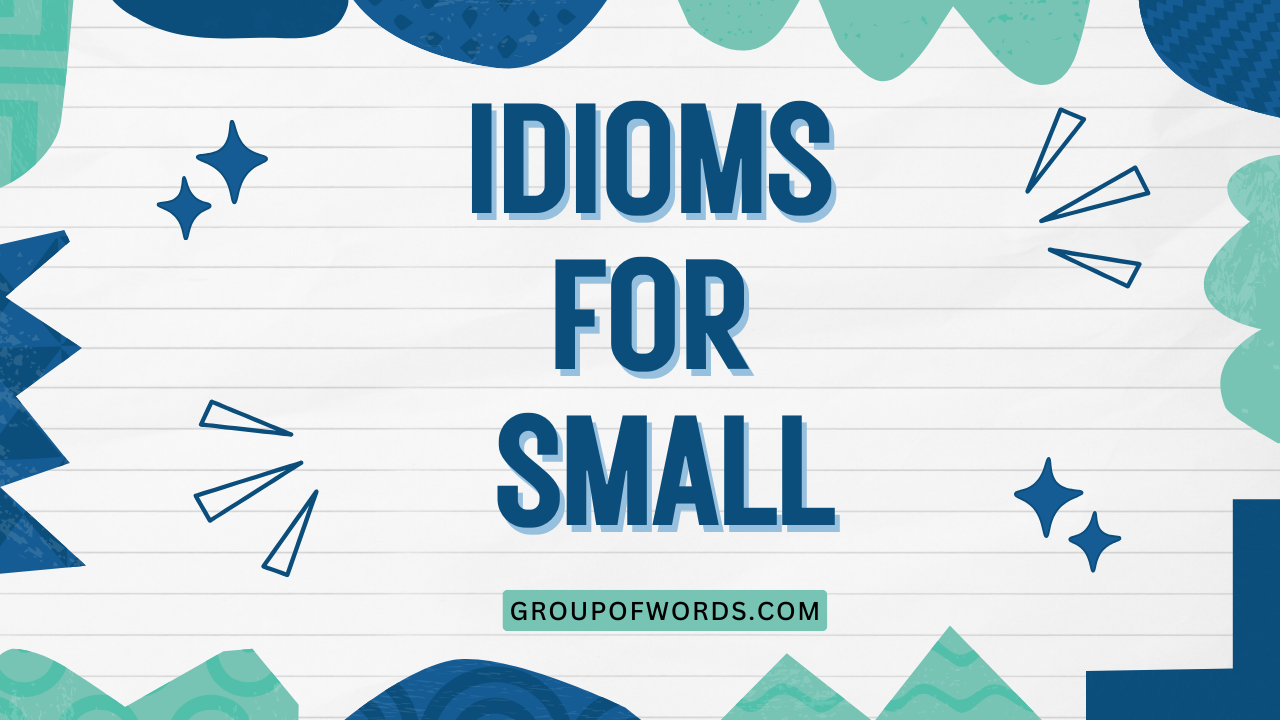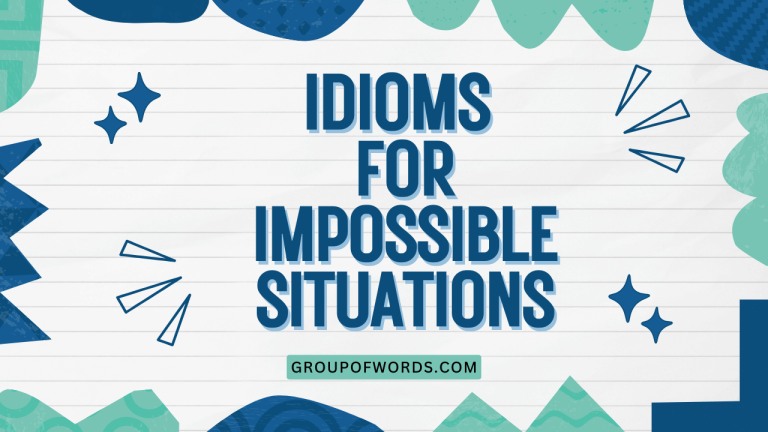Idioms for “Small”: A Comprehensive Guide
Idioms add color and depth to the English language, allowing for nuanced expression beyond literal meanings. Understanding idioms related to the concept of “small” is crucial for anyone aiming to master English fluency.
These idioms appear frequently in both spoken and written English and understanding them will enhance your comprehension and communication skills. This article provides a comprehensive guide to idioms for “small,” covering their definitions, usage, examples, and common mistakes.
Whether you’re a beginner or an advanced learner, this guide will help you confidently navigate these intriguing expressions.
Table of Contents
- Introduction
- Definition of Idioms for “Small”
- Structural Breakdown
- Types and Categories of Idioms for “Small”
- Size-Related Idioms
- Importance-Related Idioms
- Quantity-Related Idioms
- Time-Related Idioms
- Examples of Idioms for “Small”
- Size-Related Examples
- Importance-Related Examples
- Quantity-Related Examples
- Time-Related Examples
- Usage Rules
- Common Mistakes
- Practice Exercises
- Exercise 1: Fill in the Blanks
- Exercise 2: Multiple Choice
- Exercise 3: Sentence Completion
- Advanced Topics
- FAQ
- Conclusion
Definition of Idioms for “Small”
Idioms are expressions whose meanings cannot be understood from the literal definitions of the individual words. They represent a figurative meaning that is culturally understood.
Idioms for “small” are phrases that use the idea of smallness to convey various concepts, often related to size, importance, quantity, or time. These idioms enrich the English language by providing concise and impactful ways to express complex ideas.
Idioms can be classified based on their function within a sentence. They can act as nouns, verbs, adjectives, or adverbs, depending on the specific idiom and its context.
Understanding the function helps in proper usage. The context in which an idiom is used is crucial for interpreting its meaning correctly.
The same idiom may have slightly different connotations depending on the situation.
Structural Breakdown
The structure of idioms can vary significantly. Some idioms are simple phrases, while others are complex sentences.
Many idioms follow specific grammatical patterns that are essential to their meaning. For instance, some idioms require specific prepositions or verb tenses.
Recognizing these patterns will improve your ability to understand and use idioms effectively. For example, the idiom “a drop in the bucket” follows a clear noun phrase structure.
Another example is “small potatoes” which also is a noun phrase structure.
Understanding the individual words within an idiom does not necessarily reveal its overall meaning. The meaning is derived from the phrase as a whole.
However, some idioms may have roots in historical or cultural contexts that provide clues to their origins. Recognizing these background stories can aid in memorization and comprehension.
Many idioms have evolved over time, adapting to changes in language and culture. Therefore, understanding the historical context can provide a deeper understanding of the idiom’s present-day usage.
Types and Categories of Idioms for “Small”
Idioms for “small” can be categorized based on the aspect of smallness they emphasize. This categorization helps in understanding the nuances and appropriate usage of each idiom.
Size-Related Idioms
These idioms refer to physical smallness or insignificance in size. They often describe something that is literally small or is perceived as being smaller than expected.
These idioms help convey a sense of scale or proportion.
Importance-Related Idioms
These idioms emphasize the lack of significance or importance of something. They are used to downplay the value or impact of a particular issue or event.
These idioms often convey a sense of triviality or insignificance.
Quantity-Related Idioms
These idioms refer to small amounts or quantities. They describe situations where the amount is considered minimal or insufficient.
These idioms help to express the scarcity or limited nature of something.
Time-Related Idioms
These idioms refer to small durations or short periods of time. They describe events or actions that occur quickly or are of brief duration.
These idioms often convey a sense of urgency or brevity.
Examples of Idioms for “Small”
This section provides a wide range of examples, categorized by the type of smallness they represent, to illustrate the usage of idioms for “small” in various contexts.
Size-Related Examples
The following table provides examples of idioms that relate to physical size or proportion. These idioms can be used to describe objects, spaces, or even abstract concepts that are considered small.
| Idiom | Meaning | Example Sentence |
|---|---|---|
| Small world | An expression used when encountering someone unexpectedly or discovering a surprising connection. | “I can’t believe you know my cousin! It’s a small world.” |
| Pocket-sized | Very small; easily carried in a pocket. | “This pocket-sized dictionary is perfect for traveling.” |
| In a nutshell | Briefly; in a concise manner. | “In a nutshell, the project was a success.” |
| A drop in the ocean/bucket | A very small amount compared to what is needed. | “The money we raised was just a drop in the ocean compared to the total cost.” |
| Little by little | Gradually; slowly over time. | “Little by little, she improved her English skills.” |
| A speck of dust | A tiny, almost insignificant amount. | “There wasn’t a speck of dust in the entire house.” |
| Bite-sized | Small enough to be eaten in one bite; easily manageable. | “The presentation was broken down into bite-sized pieces.” |
| Miniature version | A small-scale copy. | “He built a miniature version of the Eiffel Tower.” |
| Teeny-tiny | Extremely small. | “She found a teeny-tiny spider in the corner.” |
| Marginal | Very small or insignificant. | “The difference between the two products was marginal.” |
| Fine line | A subtle distinction. | “There is a fine line between confidence and arrogance.” |
| Close call | A narrow escape from danger or disaster. | “It was a close call when the car almost hit the pedestrian.” |
| Slim chance | A very small possibility. | “There is a slim chance that he will win the lottery.” |
| Small print | The less noticeable or important terms and conditions in a contract. | “Always read the small print before signing any agreement.” |
| A hair’s breadth | A very small distance or margin. | “The bullet missed him by a hair’s breadth.” |
| Inch by inch | Moving or progressing very slowly. | “They moved the heavy box inch by inch until they reached the door.” |
| Microscopic | Extremely small; visible only under a microscope. | “The bacteria were microscopic.” |
| Peewee | Very small, especially in size. | “That is a peewee football team.” |
| It’s a wash | When the gains and losses are equal (small outcome). | “After the expenses, it’s a wash.” |
| Diminutive | Extremely or unusually small. | “She had a diminutive stature.” |
| Thumbnail | Very small or concise. | “Here’s a thumbnail sketch of what happened.” |
| Tidbit | A small and interesting piece of information. | “Here’s a tidbit for you.” |
The table above presents various size-related idioms. These idioms often relate to physical dimensions or the perceived size of something.
Understanding these idioms allows for more descriptive and nuanced communication.
Importance-Related Examples
The following table provides examples of idioms that relate to the lack of importance or significance. These idioms are used to downplay the value or impact of something.
| Idiom | Meaning | Example Sentence |
|---|---|---|
| Small potatoes | Unimportant or trivial matters. | “Don’t worry about the details; they’re just small potatoes.” |
| Not amount to a hill of beans | To be of no importance or value. | “His opinion doesn’t amount to a hill of beans.” |
| A flash in the pan | Something that shows initial promise but fails to deliver. | “His success was just a flash in the pan.” |
| Make no bones about it | To be clear and direct about something. | “Let’s make no bones about it, this is a serious issue.” |
| Take something with a grain of salt | To not take something too seriously or literally. | “I take his stories with a grain of salt.” |
| Not worth a dime | Having no value or worth. | “That old car isn’t worth a dime.” |
| Water under the bridge | Past events that are no longer important. | “That argument is water under the bridge now.” |
| Of little consequence | Not important or significant. | “The mistake was of little consequence.” |
| Not worth the paper it’s written on | Completely worthless. | “That contract isn’t worth the paper it’s written on.” |
| No big deal | Not a problem; not important. | “It’s no big deal if you’re late.” |
| Trivial matter | An issue of little importance. | “It’s just a trivial matter, don’t worry about it.” |
| Of no account | Of no importance or value. | “His opinion is of no account.” |
| Paltry sum | A ridiculously small amount of money. | “He was offered a paltry sum for his work.” |
| Feather in one’s cap | An accomplishment or honor (sometimes used sarcastically to mean it’s not important). | “Winning that small award isn’t really a feather in one’s cap.” |
| Not to worry | Don’t be concerned; it’s not a problem. | “Not to worry, I’ll take care of it.” |
| Much ado about nothing | A lot of fuss over something unimportant. | “The whole controversy was much ado about nothing.” |
| Not a pin | Worthless; of no value whatsoever. | “I don’t care about the project, it’s not worth a pin!” |
| Peddling peanuts | Dealing with insignificant things or small amounts of money. | “I am not peddling peanuts here!” |
| Dust in the wind | Something insignificant that fades away quickly. | “All his achievements will be dust in the wind.” |
| Insignificant | Too small or unimportant to be worth considering. | “The number of people affected was insignificant.” |
| Negligible | So small or unimportant as to be not worth considering; insignificant. | “The impact of the change was negligible.” |
The table above highlights idioms that diminish the importance of something. These expressions are valuable for expressing opinions about significance and relevance.
Quantity-Related Examples
The following table provides examples of idioms that relate to small quantities or amounts. These idioms are used to describe situations where the quantity is considered minimal or insufficient.
| Idiom | Meaning | Example Sentence |
|---|---|---|
| A handful | A small quantity or number. | “Only a handful of people attended the meeting.” |
| A smattering | A small amount of something, especially knowledge. | “He only has a smattering of French.” |
| Few and far between | Not frequent; rare. | “Opportunities like this are few and far between.” |
| A trickle | A small, slow flow of something. | “Only a trickle of information was released to the public.” |
| A modicum | A small amount of something desirable or valuable. | “He showed a modicum of respect.” |
| A scintilla | A tiny spark or trace amount. | “There wasn’t a scintilla of evidence.” |
| A pittance | A very small or inadequate amount of money. | “She was paid a pittance for her hard work.” |
| In short supply | Not readily available; scarce. | “Tickets for the concert are in short supply.” |
| A drop in the bucket | A very small amount compared to what is needed. | “The donation was a drop in the bucket compared to the total cost.” |
| A shade | A slight degree or amount. | “It’s a shade too expensive.” |
| A touch | A small amount. | “Add a touch of salt.” |
| A soupçon | A very small amount; a trace. | “There was a soupçon of doubt in her mind.” |
| Skimpy | Meager; less than adequate. | “The portions were skimpy.” |
| Sparse | Thinly dispersed or scattered. | “The attendance was sparse.” |
| Barely any | Almost none. | “There was barely any food left.” |
| A fragment | A broken-off or incomplete part. | “Only a fragment of the story remained.” |
| A smidgen | A very small amount. | “Add just a smidgen of pepper.” |
| A dash | A small quantity of something added to a drink or food. | “Add a dash of bitters to the cocktail.” |
| A hint | A slight indication; a small amount. | “There was a hint of sarcasm in her voice.” |
| A sprig | A small stem bearing leaves or flowers. | “Garnish with a sprig of parsley.” |
| A wafer-thin | Extremely thin. | “The margin was wafer-thin.” |
This table provides idioms to describe limited quantities. These expressions are useful when discussing scarcity or insufficiency.
Time-Related Examples
The following table provides examples of idioms that relate to short periods of time or brief durations. These idioms are used to describe events or actions that occur quickly or are of brief duration.
| Idiom | Meaning | Example Sentence |
|---|---|---|
| In a flash | Very quickly; instantaneously. | “The storm appeared in a flash.” |
| In the blink of an eye | Extremely quickly; almost instantly. | “The children grew up in the blink of an eye.” |
| A split second | A very brief moment of time. | “He hesitated for a split second.” |
| A fleeting moment | A brief and quickly passing moment. | “It was just a fleeting moment of happiness.” |
| A short while | A brief period of time. | “I’ll be back in a short while.” |
| A quick minute | A brief period of time. | “Can I have a quick minute of your time?” |
| Before you know it | Very soon; quickly. | “Before you know it, summer will be over.” |
| In no time | Very quickly; almost immediately. | “She finished the project in no time.” |
| Just a sec | A short moment. | “Just a sec, I’ll be right back.” |
| Short-lived | Lasting for only a short time. | “Their happiness was short-lived.” |
| In passing | Briefly; casually. | “He mentioned it in passing.” |
| A snap of the fingers | Very quickly; almost instantly. | “He got the job at the snap of the fingers.” |
| A nano-second | An extremely short period of time. | “It happened in a nano-second.” |
| A while back | A short period of time ago. | “I saw him a while back.” |
| Ere long | Before long; soon. | “Ere long, they will be here.” |
| In a jiffy | Very quickly; in a moment. | “I’ll be there in a jiffy.” |
| Momentarily | For a very short time. | “The power was lost momentarily.” |
| Quick as a wink | Extremely fast. | “The cake disappeared as quick as a wink.” |
| Briefly | For a short time. | “I spoke with her briefly.” |
| In an instant | Immediately; instantly. | “The food vanished in an instant.” |
| Posthaste | With great speed or immediacy. | “We need to get the report to him posthaste.” |
This table presents idioms that describe brief periods of time. These idioms are useful for expressing the duration of events or actions.
Usage Rules
Using idioms correctly involves understanding their specific meanings and contexts. Pay attention to the grammatical structure of the idiom. Some idioms require specific verb tenses or prepositions. For example, “take something with a grain of salt” always uses the preposition “with.” Consider the audience and the formality of the situation. Some idioms are more appropriate for informal conversations than formal writing. Slang terms are usually avoided in academic and professional contexts. Be aware of regional variations. Some idioms may be more common in certain regions or dialects.
Avoid overusing idioms. While idioms can enrich your language, using too many can make your speech sound unnatural or forced. It’s better to use them sparingly and appropriately. Double-check the meaning of an idiom before using it. Misusing an idiom can lead to confusion or miscommunication. Consult a dictionary or reliable source if you’re unsure of the meaning. Be mindful of cultural differences. Some idioms may not translate well across different cultures, and their meanings may be misunderstood. When communicating with people from different cultural backgrounds, it’s best to use clear and straightforward language.
Common Mistakes
One common mistake is misinterpreting the literal meaning of the words in an idiom. For example, if someone says “don’t make a mountain out of a molehill,” they don’t literally mean you’re building a mountain. They mean you’re exaggerating a small problem. Another common mistake is using the wrong form of an idiom. For instance, saying “a drop in the sea” instead of “a drop in the ocean” changes the meaning. A third mistake is overusing idioms or using them in inappropriate contexts. In formal writing, it’s better to use more direct and precise language.
Here are some examples of correct versus incorrect usage:
| Incorrect | Correct | Explanation |
|---|---|---|
| “That’s big potatoes.” | “That’s small potatoes.” | “Small potatoes” means unimportant, while “big potatoes” is not a standard idiom. |
| “It was a flash in the pot.” | “It was a flash in the pan.” | The correct idiom is “flash in the pan,” referring to something that initially seems promising but quickly fades. |
| “I take his words with a salt of grain.” | “I take his words with a grain of salt.” | The correct preposition is “grain of salt,” not “salt of grain.” |
| “It’s a drop in the sea.” | “It’s a drop in the ocean/bucket.” | The idiom is “a drop in the ocean/bucket,” meaning a very small amount compared to what’s needed. |
| “She is in short of supply.” | “She is in short supply.” | The correct form is “in short supply,” without the preposition ‘of’. |
Practice Exercises
Test your understanding of idioms for “small” with these practice exercises. Each exercise focuses on different aspects of idiom usage.
Exercise 1: Fill in the Blanks
Fill in the blanks with the correct idiom from the list below.
(small potatoes, in a nutshell, a drop in the bucket, few and far between, in the blink of an eye)
| Question | Answer |
|---|---|
| 1. The money we raised was just _______ compared to the total cost. | a drop in the bucket |
| 2. Opportunities like this are _______. | few and far between |
| 3. _______, the project was a success. | In a nutshell |
| 4. Don’t worry about the details; they’re just _______. | small potatoes |
| 5. The children grew up _______. | in the blink of an eye |
| 6. Compared to the overall budget, the cost of the repair was _______. | small potatoes |
| 7. Finding affordable housing in the city is _______. | few and far between |
| 8. _______, the company restructured to improve efficiency. | In a nutshell |
| 9. The amount of water saved from the campaign was _______ considering the drought. | a drop in the bucket |
| 10. _______, the deal was closed and the contract was signed. | In the blink of an eye |
Exercise 2: Multiple Choice
Choose the correct meaning of the idiom in the following sentences.
| Question | Options | Answer |
|---|---|---|
| 1. It’s a small world! What does this mean? | a) The world is physically small. b) People are often connected in surprising ways. c) Small animals live everywhere. | b) People are often connected in surprising ways. |
| 2. His opinion doesn’t amount to a hill of beans. What does this mean? | a) His opinion is valuable. b) His opinion is worthless. c) He likes beans. | b) His opinion is worthless. |
| 3. I’ll be back in a short while. What does this mean? | a) I’ll be back soon. b) I’ll be gone for a long time. c) I’ll be back to describe something short. | a) I’ll be back soon. |
| 4. The portions at the restaurant were skimpy. What does this mean? | a) The portions were generous. b) The portions were insufficient. c) The portions were well-prepared. | b) The portions were insufficient. |
| 5. Don’t make a mountain out of a molehill. What does this mean? | a) Exaggerate the problem. b) Minimize the problem. c) Ignore the problem. | a) Exaggerate the problem. |
| 6. Their happiness was short-lived. What does this mean? | a) Their happiness lasted a long time. b) Their happiness didn’t last long. c) They were never happy. | b) Their happiness didn’t last long. |
| 7. He hesitated for a split second. What does this mean? | a) He hesitated for a long time. b) He hesitated very briefly. c) He never hesitated. | b) He hesitated very briefly. |
| 8. That contract isn’t worth the paper it’s written on. What does this mean? | a) The contract is valuable. b) The contract is worthless. c) The contract is well-written. | b) The contract is worthless. |
| 9. He mentioned it in passing. What does this mean? | a) He mentioned it briefly. b) He mentioned it at length. c) He never mentioned it. | a) He mentioned it briefly. |
| 10. That candidate has a slim chance of winning the election. What does this mean? | a) He has a great chance of winning. b) He has a very small chance of winning. c) He has no chance of winning. | b) He has a very small chance of winning. |
Exercise 3: Sentence Completion
Complete the following sentences using an appropriate idiom for “small”.
| Question | Answer |
|---|---|
| 1. I can’t believe I ran into my old friend from high school here. It’s such a _______. | small world |
| 2. The company’s profits this quarter were _______ compared to last year. | small potatoes |
| 3. Finding a parking spot downtown on a Saturday night is _______. | few and far between |
| 4. He finished the race _______, setting a new personal record. | in the blink of an eye |
| 5. The amount of rain we received was just _______ considering the severe drought. | a drop in the bucket |
| 6. The difference in quality between the two products was _______. | marginal |
| 7. She only packed a _______ of clothes for the weekend trip. | handful |
| 8. He hesitated for _______ before answering the question. | a split second |
| 9. He offered her a _______ for all the work she had done. | pittance |
| 10. The old house was _______, with barely enough room to move around. | pocket-sized |
Advanced Topics
For advanced learners, exploring the etymology and historical context of idioms can provide a deeper understanding of their usage. Many idioms have origins in specific historical events, cultural practices, or literary works.
Researching these origins can provide valuable insights into the nuances of the English language. For example, the idiom “a drop in the bucket” originates from the idea that a single drop of water is insignificant compared to the vastness of the ocean or the volume of a bucket.
Analyzing how idioms are used in literature and media can also enhance your understanding. Pay attention to how authors and speakers use idioms to convey specific meanings and emotions.
Consider the context in which the idiom is used and how it contributes to the overall message. Exploring regional variations in idiom usage can further expand your knowledge.
Different regions or dialects may have unique idioms or variations of common idioms. Being aware of these variations can help you avoid misunderstandings and communicate more effectively.
FAQ
Here are some frequently asked questions about idioms for “small”:
- What is an idiom?
An idiom is a phrase or expression whose meaning cannot be understood from the literal meanings of its individual words. It’s a figurative expression with a culturally understood meaning.
- Why is it important to learn idioms?
Learning idioms is crucial for understanding native English speakers and for expressing yourself more naturally and fluently. Idioms add color and depth to your language skills.
- How can I learn idioms effectively?
Learn idioms in context, practice using them in your own speech and writing, and consult reliable resources like dictionaries and language learning websites. Repetition and active usage are key.
- Are idioms universal?
No, idioms are not universal. They are often culture-specific and may not translate directly into other languages. What makes sense in one culture might be confusing or nonsensical in another.
- Can I create my own idioms?
While it’s technically possible to create new phrases, they won’t be considered idioms unless they gain widespread acceptance and usage within a language community. Idioms typically evolve organically over time.
- How do I avoid misusing idioms?
Pay close attention to the context in which you use idioms, double-check their meanings in a reliable dictionary, and practice using them in various situations. If you’re unsure, it’s better to use a more straightforward expression.
- What are some good resources for learning idioms?
There are many excellent resources available, including idiom dictionaries, language learning websites, online courses, and books dedicated to English idioms. Look for resources that provide examples and contextual information.
- Is it okay to use idioms in formal writing?
It depends on the specific idiom and the tone of your writing. Some idioms are perfectly acceptable in formal contexts, while others are more appropriate for informal communication. Use your judgment and consider your audience.
- How can I improve my understanding of idioms in spoken English?
Listen to native English speakers in various contexts, such as movies, TV shows, podcasts, and conversations. Pay attention to how they use idioms and try to infer their meanings from the surrounding conversation.
Conclusion
Mastering idioms for “small” is a valuable step toward achieving fluency in English. By understanding the definitions, usage rules, and common mistakes associated with these expressions, you can enhance your communication skills and express yourself more effectively.
Remember to learn idioms in context, practice using them regularly, and consult reliable resources when needed. With dedication and practice, you can confidently navigate the world of English idioms and enrich your language abilities.
Keep exploring, keep practicing, and enjoy the journey of learning!






